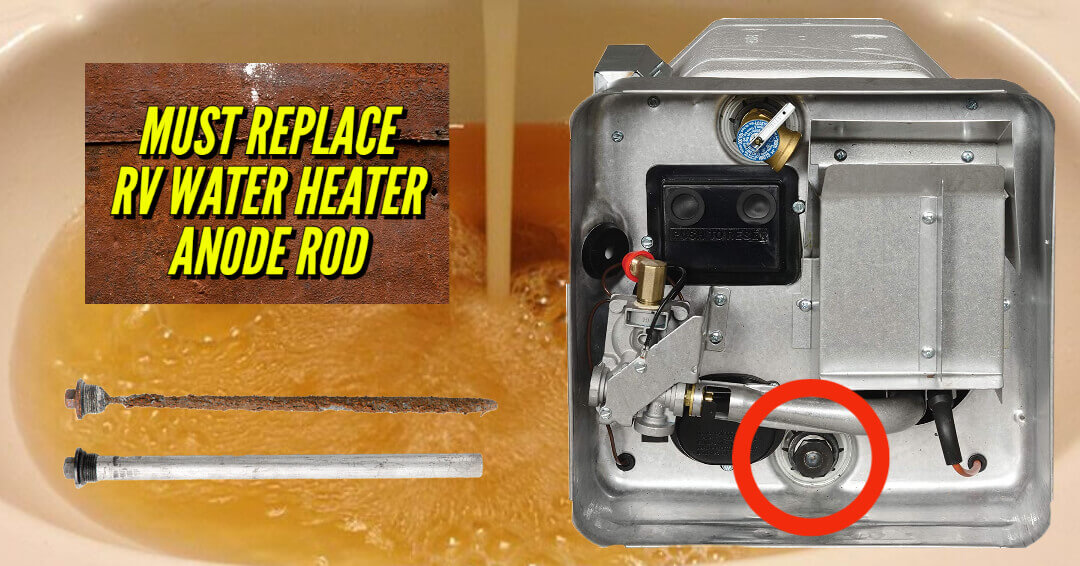- Home Page
- RVing Tips & Tricks
- Why You Must Replace Your RVs Water Heaters Anode Rod
Why You Must Replace Your RVs Water Heaters Anode Rod
This is why you must replace your RVs water heaters anode rod at least once a year if your RV has a Suburban Water Heater
The question is why you must replace your RVs water heaters anode rod at least once a year if your RV has a Suburban Water Heater? An Anode Rod as pictured on the top of this page is used on Suburban RV Water Heaters to Extend the life of the water heater by attracting corrosive elements in the water that could corrode and rust the water heater tank.
The Anode Rod is part of the Suburban Water Heater's drain plug. It should be checked at least once a year and should be replaced when half of the rod has been corroded.
If you wait to change the rod until it is totally corroded, you stand a chance of corrosive damage to the tank. Also, excess sediment from the Anode Rod can cause flow problems with your RV's freshwater system. You may also have rusty water coming out of the faucets in your RV.
The video below explains how to replace the Anode Rod.
Supplies Needed
As the video states, when you are replacing the Anode Rod it is also a good time to flush your RV's Water Heater to get rid of any Sediment etc.
Why You Should Flush Out Your RV Water Heaters Tank at Least 2 Times a Year
- It prevents damage to the tank from the sediment in the tank entering your RVs freshwater system
- It prevents the sediment from clogging the RV's freshwater plumbing
- Prevents hot water bad "rotten egg" smell
Hopefully, you now know why you must replace your RVs water heaters anode rod and flush out the water heater tank.
How often should you replace an RV water heater Anode Rod?
How often should you replace an RV water heater Anode Rod?
An RV Water Heater Anode Rod should be replaced at least once a year. If you are a full time RVer, you should replace Anode Rod twice a year.
Which RV Water Heaters have Anode Rods?
Which RV Water Heaters have Anode Rods?
Anode Rods are needed for Suburban RV Water Heaters because they have metal tanks.
What happens if you don't replace your RV's water heater Anode rod?
What happens if you don't replace your RV's water heater Anode rod?
If you wait to change the rod until it is totally corroded, you stand a chance of corrosive damage to the tank. Also, excess sediment from the Anode Rod can cause flow problems with your RV's freshwater system. You may also have rusty water coming out of the faucets in your RV.
Why should you flush out your RV's Water Heater?
Why should you flush out your RV's Water Heater?
- It prevents damage to the tank from the sediment in the tank entering your RVs freshwater system
- It prevents the sediment from clogging the RV's freshwater plumbing
- Prevents hot water bad "rotten egg" smell
COMMENTS
Responding to Jeff Ellis
by: David Larade
Hi Jeff, it's great that your hot water is working great but you should at least check the condition of your anode rod. If you remove your drain plug in your hot water tank to drain it then your anode rod should be attached to your drain plug. They are fairly inexpensive to replace and might save you from an expensive hot water tank replacement in the future. You should also check your hot water tank's pressure relief valve and make sure that's operable by lifting the little lever on the top of it and then releasing it to make sure it goes back in place! Do this before turning on your hot water on as doing it when the water has heated could get you scalded!! Also if the valve malfunctions when you try this then water will leak from it when you fill your tank but at least your tank will not blow up if it malfunctions! They are screwed into your tank and can be bought at any hardware store! Good luck!
Water heater anode rod 15 years old
Just read about replacing the anode rod. When we had our new water heater put in in 2006, no one explained that I needed to replace it.
It's now approx 14 yrs old. Is it too late? Do I need to replace the water heater?
Every once in a while we do get an odor from our water. But I think that's from the cold water line and having to do with too much rain.
Anyway- at 14 years with no Anode rod replacement, should I just replace the whole thing, or is there a way to check if it's still OK?
Hot water works fine.





Comments
Do you have a comment on this topic? You can leave your comment in the box below.